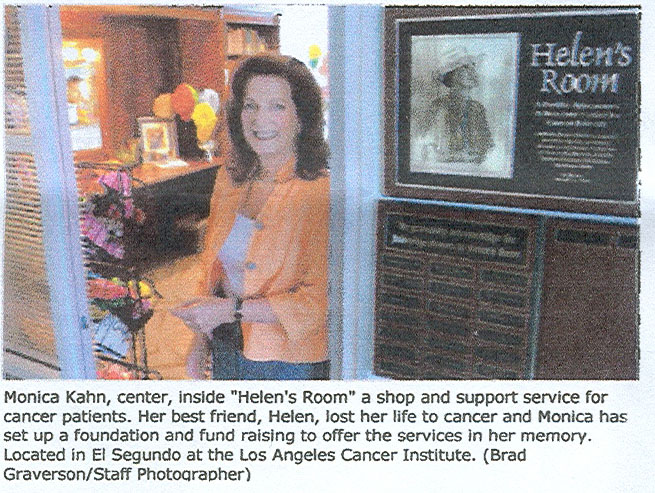About Helen's Room
In honor of cancer patient Helen Rindfleisch.
There is a community of cancer patients who, for lack of financial means, resort to covering their hairless heads with shower caps and filling post-surgery bra cups with bags of birdseed. Some of them deal with their overwhelming journey alone.
Since 1998, Helen’s Room, created by Monica Kahn, has been a lifesaver for this under served population – providing dignity in the form of free services that include head coverings, prostheses and support.
“The services that she provides these patients is unbelievable. She will do anything in her power to help them,” said Dr. David Khan, a radiologist and co-worker of Kahn’s.
Originally located in the radiology and oncology department at Daniel Freeman Memorial Hospital in Inglewood, Helen’s Room relocated to St. Mary’s Academy across the street after the medical facility closed in 2008. In February, Helen’s Room returned to a radiation department after its two-year stay in the St. Mary’s convent, relocating to the Los Angeles Cancer Institute in El Segundo.
Kahn already had been volunteering at Daniel Freeman Memorial Hospital for several years when, in 1990 her longtime friend Helen Rindfleisch was diagnosed with lung cancer.
After Rindfleisch’s death in 1992, Kahn began to feel dissatisfied with the fundraising aspect of her community service, so she became trained as a resource, guidance and information volunteer through the American Cancer Society.
She also got her bereavement certification and began holding support groups at the hospital for those who had lost loved ones. It was essential to her, she said, to connect with the patients.
It has been important to Rindfleisch to maintain her appearance during cancer treatment, Kahn recalled. Ridnfleisch had said if she didn't’t get up and put on her makeup each day she might as well have stayed in bed to die.
Inspired by this-and by “image centers” at UCLA Center for Integrative Oncology and St. John’s Health Center-Kahn decided to provide a similar service to the local community, for free, naming it Helen’s Room in honor of her friend.
The idea is that patients can come for an hour-long private consultation with Kahn or another trained volunteer to try on head coverings, receive mastectomy bras and prostheses, and generally improve their self-image.
Helen’s Room also holds a support group, allowing women coping with cancer to connect with one another. For those who need more in-depth help, Helen’s Room refers clients to other centers and will pay for their treatment there for a short time.
Kahn said she chooses not to spend funds on advertising, preferring that every penny possible go to products and patient services. Most clients who come in, she said, hear of Helen’s Room by word of mouth or are referred by their oncologist or radiologist.
Dr. Allan Orenstein sends many of his patients to Helen’s Room
“Monica is like Mother Teresa, she’s a real saint,” he said. “Being with her for an hour is more important than the wig or the turban that they get.”
In the beginning, Kahn said, she had two missions for the charity: that it be open to anybody in the area and that it be free for the clients. Kahn said clients never had to prove they couldn't’t afford the services.
“I didn't’t want to go through the financial screening process-most of the underserved people I see, that’s what they do all time, they have to show how poor they are,” she said. “The purpose of this is not to have any of that even come into it.”
Many clients who visit Helen’s Room and do have funds, Kahn said, end up donating.
“It’s a win-win situation,” she said. “They get the tax deduction and I get the donation.”
The move to El Segundo has allowed Helen’s Room to expand a little and the new site had windows, which the previous location lacked.
Shelves covered in colorful hats, sparkly turbans, scarves and hairpieces dominate the space. Built into the shelves is a vanity with Hollywood dressing room-style lights, where the patient sits.
Images of Rindfleisch wearing head coverings and eye make are sprinkled throughout Helen’s Room, where Kahn or one of her volunteers listens to each client’s story.
Kahn described and incredible intimacy that can develop with patients five minutes after they enter the room.
Volunteer Naomi Jones, 69, has helped at Helen’s Room for five years. She likened the space to “The Secret Garden.”
“I don’t know how to explain what happens in there,” she said. “It’s magic.”
Kahn said finding the right head covering may seem simple enough, but when it happens, it can bring a smile to a client’s face, even encourage her in her fight against cancer.
“Wigs can be fun-you’ll put something on and it could look hilarious and ridiculous and sometimes you can laugh a lot,” Kahn said. “Other times, you can put one on and they’re gorgeous.”
She said about 99 percent of the women who come in are preoccupied with their hair loss. They apologize for their vanity when they’re painfully aware they have a life-threatening disease to get through, she said.
“It’s humbling to walk around bald,” said Clara Duran-Reed, a 47-year-old breast cancer patient and a client of Helen’s Room. “I’ve been in settings where I haven’t worn a wig or a hat and it really makes people afraid to come up to me.”
“Our image, especially in such a difficult time, is very important to us,” she said. “It gives us something, a little hope, a little strength.”
Duran-Reed expressed gratitude for the humanity shown by Kahn and the recourses she has made available to her clients.
Thank-you notes on the shelves in Helen’s Room echo this sentiment.
“I felt like a queen in Helen’s Room,” wrote one client. And another: “Love is kind, and you do it so well.”
-Taken from a Daily Breeze article written by Alexandra Garreton, April 21, 2010.

